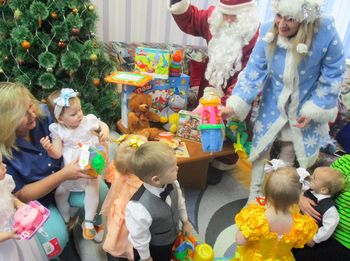
cyber-Wear makes children’s eyes light up
 Shortly before Christmas, and thanks to our support of the German organisation Hilfe für Tschernobyl-geschädigte Kinder (Help for Children Affected by Chernobyl), the presents table in a children’s home was well stocked.
Shortly before Christmas, and thanks to our support of the German organisation Hilfe für Tschernobyl-geschädigte Kinder (Help for Children Affected by Chernobyl), the presents table in a children’s home was well stocked.Shortly before Christmas, wonderful pictures reached us from Mogilev, Belarus. As in previous years, cyber-Wear donated to the German charitable organisation Hilfe für Tschernobyl-geschädigte Kinder (Help for Children Affected by Chernobyl). The organisation, which is based in the Rhineland region, not only runs the children’s home in Mogilev but also organises and supports social and medical projects in the affected region.
The donation was used to buy Christmas presents such as painting and drawing materials, Christmas decorations, sweets and toys for the children in the home, so that the eyes of the children here could also light up over the holidays. That alone is thanks enough, but the home management also thanked us in an emotional letter that they wrote on the children’s behalf:
“The team from the Mogilev children’s home would like to thank you from the bottom of our hearts for your friendly and, as always, generous support of the children in our children’s home. Thanks to your keenness to help, we were able to create a great festive atmosphere, which is very important for the children. Although they are only young, they are well able to express emotion and their delight at the presents.
Your donation also made it possible for every child to receive a present (a wonderful basket of sweets) from Grandfather Frost and the Snow Maiden. That brought the children great joy and happiness!
We would like to thank you for regularly helping our children over the course of many years. It has become a great tradition for us to give lovely Christmas presents on your behalf and in your name to our children who, due to the will of fate, have not had much luck in life.”
More than three decades have passed since the explosion in Ukraine’s Chernobyl nuclear power station on 26 April 1986. About 30% of neighbouring Belarus was contaminated. The area in and around Mogilev was one of the more heavily affected areas. The population of this region will have to bear the brunt of the consequences of this disaster for decades to come. The situation is so perilous because the dangers are not visible and the government does not have the money to tackle the problem at its root.
Children are particularly affected. Four years after the catastrophe, an abrupt increase in incidences of thyroid cancer in children was determined. This figure is still increasing even today. Experts are of the opinion that increases in the incidence of thyroid cancer will also be observed over the next 10 years. Only after that is a slight decline anticipated.




